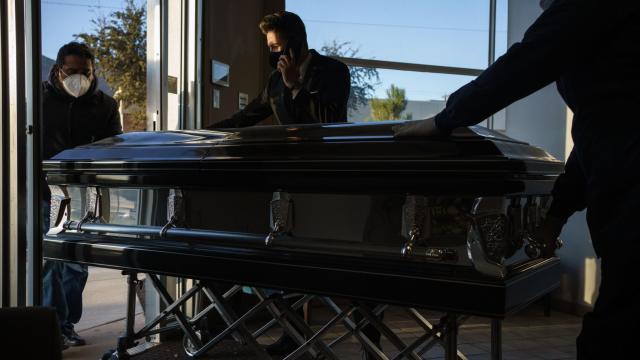There’s blood in the water in Texas. No, I’m not being metaphorical or quoting a country song. I mean that Austin funeral homes have been pouring human blood from corpses down the drain along with toxic embalming fluids.
Several embalmers in the Austin area say that whatever blood, bodily fluids, and embalming liquid come out of deceased human bodies simply get flushed down the sink, according to reporting by the Austin-American Statesman. Austin water officials said they had no idea this was common practice.
Amy Petri, the communications manager for the Office of Sustainability, said that funeral homes were in violation of a Texas Commission on Environmental Quality ordinance because they didn’t have written permission to dump the fluids.
“Austin Water has not received any permit applications from funeral homes for the discharge of medical waste,” she wrote in an email.
However, she said that she doesn’t think the fluids are posing any health or environmental risks. She noted that Centre for Disease Control guidelines allow for the disposal of medical waste through the sanitary sewer system. She also said that the National Association of Clean Water Agencies recently recognised Austin wastewater treatment plants with peak performance awards, and added that Austin doesn’t reuse treated wastewater for any potable purposes — the water and wastewater treatment processes are kept separate and to protect against accidental discharges of industrial waste.
“Austin Water is confident that our treatment processes are handling these materials that may be entering the sanitary sewer system,” she said.
Texas Funeral Service Commission executive director Glenn Bower also said it’s nothing to worry about.
“It is quite common and it is not dangerous at all,” he wrote in an email.
Bowser added that the disposal method is not exactly a secret. Some 1,600 funeral homes statewide dispose of fluid remains in this way, and the practice is taught in institutions throughout the state.
“It is a safe process that is taught in all of the accredited schools; many of them are on public community college campuses,” he said. “If this was either illegal or unsafe, the public schools would not allow such practice to be taught within their campuses and classrooms.”
Still, it’s pretty gross to think about — and it’s hardly the only gnarly stuff ending up in waterways. When it comes to chicken processing plants’ or beef slaughterhouses’ wastewater, blood is among the worst forms of pollution. In 2012, after a Dallas meatpacking plant was caught dumping enough pig blood into a river to turn it red, local, state, and federal authorities teamed up to investigate. Formaldehyde is also a toxic substance, and in water, can irritate the skin in high enough doses.
According to Bowser, funeral homes’ drainage is nothing like that. He said though the Statesman’s article may invoke an image of all gallons of blood from a human body getting poured into the sink, along with pure formaldehyde, in reality the fluids drained by funeral homes are very watered down.
“There is water continuously running on the table to dilute everything that comes out of the venous system,” he said.
Green burials have become increasingly popular because they have a lighter environmental footprint. Oregon and Washington have both passed laws allowing human composting and other lower-impact forms of burial that don’t require embalming chemicals. Green graveyards have also become increasingly common across the country, though cremation is still the go-to way to go out in the U.S. (It comes with its own source of issues tied to air pollution and carbon emissions.)
Texas’ Department of Environmental Quality was not immediately available to provide a comment. This post will be updated if they send one.
